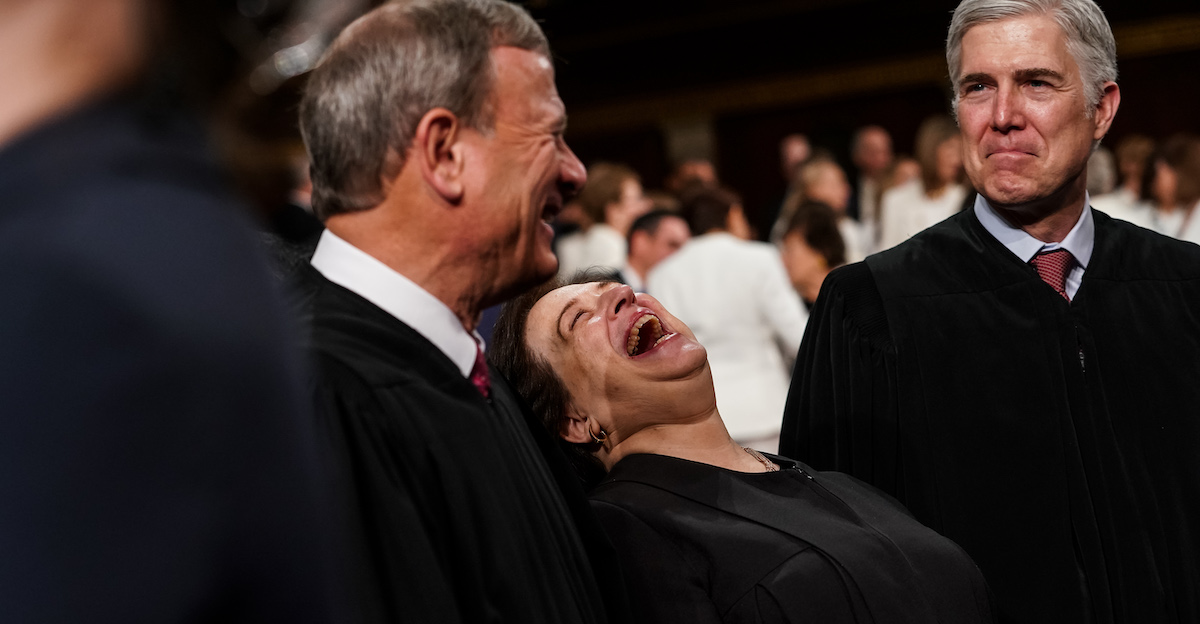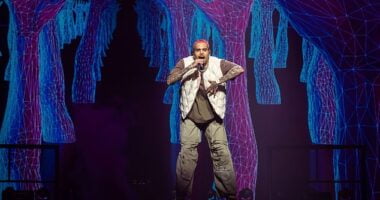
Supreme Court Justices John Roberts, Elena Kagan and Neil Gorsuch at the Capitol in Washington, DC on February 5, 2019. (Doug Mills/The New York Times POOL PHOTO) NYTSOTU
The Supreme Court heard nearly three hours of oral arguments Tuesday over the hotly-debated question of how much immunity internet companies should have under §230 (or Section 230) of the Communications Decency Act of 1996.
Under the current interpretation of Section 230, platforms such as Facebook, Twitter, and YouTube are not “publishers,” and are not liable for defamation or certain other civil claims stemming from user-created (or third-party) content that violates the law. Internet companies’ moderation decisions are also protected.
Former President Donald Trump was vocal about his distaste for Section 230 throughout his presidency—though some Democratic lawmakers have also called for at least some reforms to the law. Trump even lobbied Congress to repeal the statute, claiming (incorrectly) that such action was the remedy for discrimination against conservative viewpoints. Despite the Supreme Court’s current conservative majority, which includes three Trump appointees, the Supreme Court was not particularly receptive to the idea of cutting back Section 230 for Google or YouTube.
The specific lawsuit before the justices Tuesday was Gonzalez v. Google, which asked what liability—if any—Google should face for allowing users to post ISIS videos on YouTube.
Nohemi Gonzalez was a 23-year-old American woman who was killed in the 2015 ISIS attack on a Parisian bistro. Her family sued YouTube and its parent company Google under federal anti-terrorism law in 2016. They claimed that Google aided ISIS’s recruitment by allowing the terror group to post videos on YouTube that incited violence and sought to recruit potential ISIS members, and by recommending ISIS videos to users through its algorithms.
A divided panel of the U.S. Court of Appeals for the Ninth Circuit sided with the tech companies and found that Section 230 shields them from liability. However, in its ruling, the court’s majority hinted that it would favor a narrowing of the law’s scope—so long as that change came from Congress rather than the courts.
The Gonzalez family petitioned the Supreme Court to take up their case, arguing that Section 230 does not protect YouTube when it makes unsolicited recommendations for videos.
Just months ago, Justice Clarence Thomas signaled he would be open to revamping Section 230 when he wrote in another case that it is “hard to see” why the law should give Big Tech protection from liability for companies’ “own ‘acts and omissions.””
During oral arguments, though, none of the justices—not even Thomas—appeared willing to cut back on YouTube’s immunity in the Gonzalez case.
At the outset, Justice Thomas and Chief Justice John Roberts tag-teamed attorney and law professor Eric Schnapper, who argued on behalf of the Gonzalez family, to ask whether YouTube’s algorithms that suggest videos with corresponding thumbnail images should be considered outside the scope of Section 230’s protection. Thomas pointed out that if YouTube uses the same algorithms for a cooking enthusiast who might like to see more rice pilaf recipes as it does for an ISIS-sympathizer who wishes to see terrorist content, then the algorithm itself is “basically neutral.”
Justice Elena Kagan entered the colloquy to point out the central problem with the Court’s interpretation of Section 230: the law pre-dates the modern internet altogether.
Kagan offered some of her signature rapid-fire hypotheticals and asked Schnapper whether internet companies should be liable when social media websites prioritize certain items in users’ feeds, or when search engines act as “giant recommendation system[s].” In one recent scenario, a federal judge dismissed products liability and negligence claims brought against TikTok by the parent of a 10-year-old. The lawsuit said the girl died from the “Blackout Challenge” after learning about it due to the social media app’s algorithm, one such “recommendation system.”
What does the court really know about the internet?
Justice Kagan later joked about the wisdom of allowing the Supreme Court to answer complex questions related to the functioning of the internet.
“These are not like the nine greatest experts on the internet,” Kagan said, to much laughter from the bench and gallery.
Justice Neil Gorsuch, who participated in the arguments from home due to being “a little under the weather,” showcased his own tech-savvy by commenting several times during the marathon arguments that artificial intelligence can generate its own content, even writing poetry or making recommendations. Still, Gorsuch presented those hypothetical questions as contrasts to the kind of conduct at issue in Gonzalez.
Justice Sonia Sotomayor was likewise unwilling to chip away at Section 230’s scope. The justice called Schnapper’s argument “extreme,” and commented, “this has gone further than I thought.”
The justices softened only slightly when but equally skeptical when Deputy Solicitor Malcolm Stewart took the podium on behalf of the federal government. The Biden administration sided with the Gonzalez family, albeit in a narrow way.
Stewart that YouTube should not be immune under Section 230, because its algorithm automatically suggests and loads videos. Stewart urged the justices to create an interpretive rule that would leave the underlying substantive law to sort out which internet conduct is actionable, explaining that many such cases would be weeded out at the liability stage.
The justices did not appear particularly receptive to this plan, and Sotomayor commented that “we need a line” to determine what kind of conduct warrants immunity.
Attorney Lisa Blatt argued on behalf of the tech companies and warned that a ruling against their immunity would be disastrous for the internet in general.
Blatt maintained that because “all publishing requires organization,” internet companies’ prioritization or suggesting of various videos should not be considered independently-actionable content creation. Blatt said that websites’ ability to help users find the content they seek is key to their survival and that sites from Amazon to Yelp to Google and YouTube are all doing essentially the same thing.
Blatt advocated for the justices to view certain web functions as a “continuum,” in which an express endorsement by a site might fall outside the scope of Section 230, but a simple heading or “up next” label might not.
Justice Samuel Alito pressed Blatt on the potential harm about which she warned.
“Would Google collapse and the internet be destroyed if YouTube and therefore Google were potentially liable for posting and refusing to take down videos that it knows are defamatory and false?” Alito asked.
“I don’t think Google would, but I think but every other website might be, because they’re not as big as Google,” answered Blatt, who warned about the “deluge” of lawsuits that would likely follow.
The Gonzalez claims mirror those in Twitter v. Taamneh, which the justices will hear on Wednesday.
Listen to the full oral arguments here.
[image via Doug Mills/Getty Images/Pool]
Have a tip we should know? [email protected]









